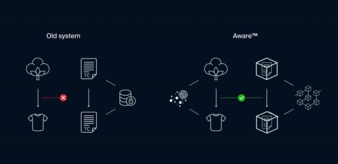09.10.23 – Aware
The art of managing public blockchains
Transaction certificates (TCs) were seen as the solution to transparency, and now Digital Product Passports (DPPs) are the new answer to nail traceability. Yet most DPPs rely on data based on the same transaction certificates putting the same pressure on suppliers with costs, audits and inefficient paperwork.
The textile industry currently faces challenges with annual audits that are time-consuming, costly, and complex. Each audit and the physical paperwork that comes along with it is said to take at least ten days per year. The core of the textile industry relies on private databases, but public blockchains are a solid solution to do mass balance and are already used in other industries for the same reason. Despite advancements in technology, supply chains lack transparency, which affects brands, suppliers, and consumers. To address this, a new textile traceability technology utilizes public blockchains to improve speed, transparency, trust, and cost-effectiveness compared to traditional traceability certificates (TCs). This innovation involves embedding physical tracers into the fiber at source and connecting primary data to a public blockchain. This eliminates the need for TC audits as material exchanges are verified by all supply chain participants, with information automatically recorded on the blockchain as crypto TCs. These crypto TCs are immutable, instantly created, publicly accessible, and free of cost, making them a more efficient and tamper-proof solution for certifications in the textile industry. Koen Warmerdam, co-founder and brand director of Aware, emphasizes the simplicity and reliability of this blockchain-based solution: “Brands and suppliers want to make a true impact and they want to be seen.”

